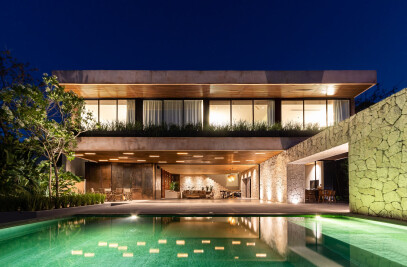Raw, devoid from cosmetic elements, minimal, almost martial… this is the resulting speech that communicates our proposal for Irori Mérida. The material palette is very straight forward: stone, concrete, steel, wood and vegetation; Beingthe same with the color palette which is evoked by the materials for them to bring up the variety of flavors there is to taste.Using three stores of a Street Mall which was previously designed by us, we propose two concepts in the same space: a restaurant and a bar, the leading role on the first one is the Sushi Bar which poses centered in the back, for the second one, the Sake bar is located in the front which unites both concepts and a future exterior terrace. Both bars are concrete blocks covered in Oak wood using clean strokes,that are only meant to be the background of what will be served on top.
The mentioned areas are divided by fixed and sliding wood and fabric screens, referring to the traditional Shoji, used in Japanese homes. The indirect illumination from spots and stripes gets complemented with pendants which its covers were custom made in steel and wood, from one side they appear to be extremely slender, creating the illusion of reeds inside a surreal mirrored ocean where the diners have been captured inside a calm ocean of flavors. On the other side they emulate the lanterns (Tourou) of those who navigate on rivers and water bodies, part of the popular Japanese summer tradition. The furniture was specifically designed for the project, using modest lines and light-colored wood to represent the assembling systems of japan.
The atmosphere is carefully subtle and punctual, presenting on one side a monumental and alive painting; setting the mood through a video projector whose background uses a white waves lattice wall; presenting a short-duration continuous sequence, a loop with different scenes from the imagination of a creative and talented digital local artist. On the other side, smaller paintings decorate the place, flanked by Clusias which complement the green palette along sides creeping plants, bonsais and a single Chaká tree; The green becomes present not only to grant freshness on the inside but as a reminder that the project belongs to a whole where the vegetation is the main tool of design, entering and merging to the inside, enhancing its transparency and fluidity.

































